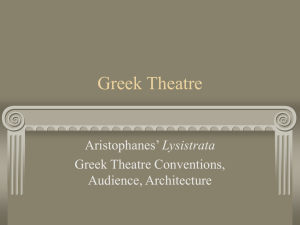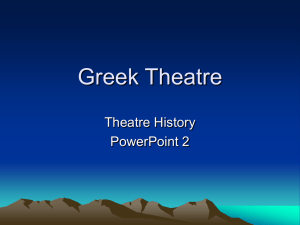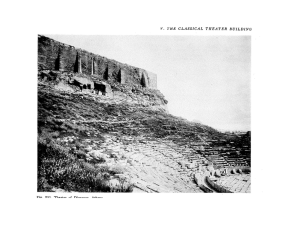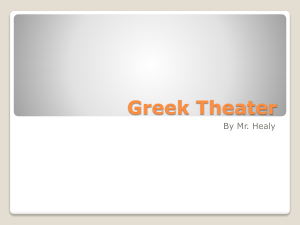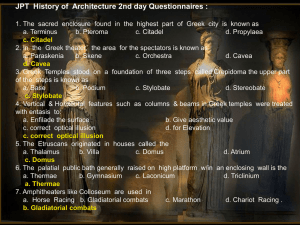Greek Theatre Packet Answers
advertisement
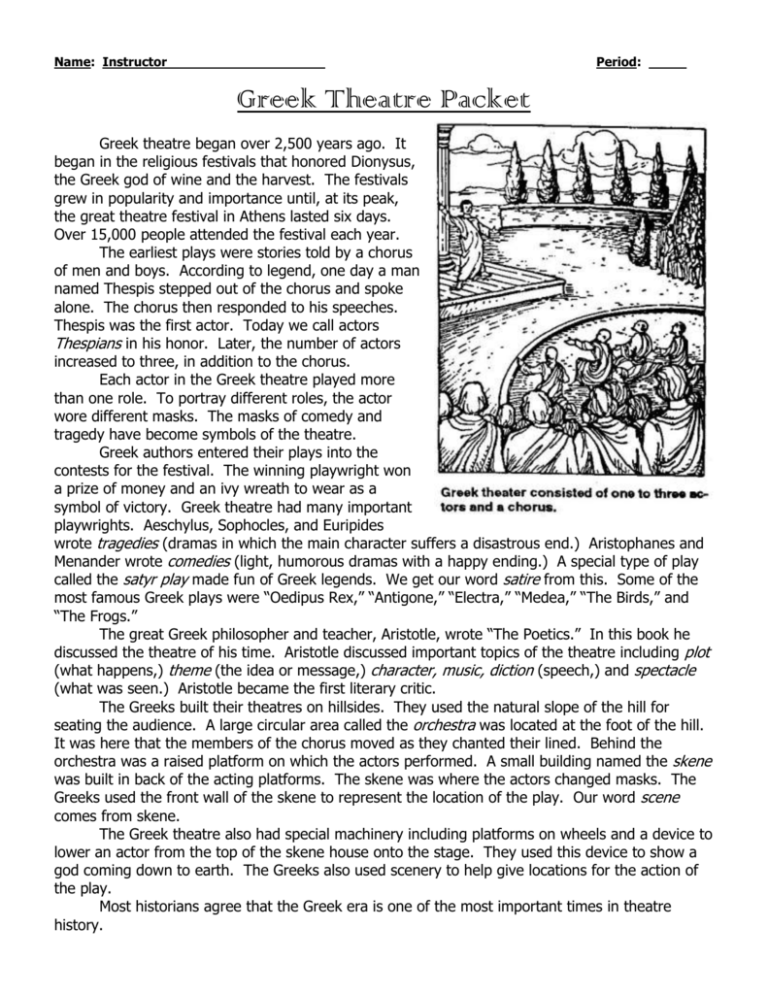
Name: Instructor Period: Greek Theatre Packet Greek theatre began over 2,500 years ago. It began in the religious festivals that honored Dionysus, the Greek god of wine and the harvest. The festivals grew in popularity and importance until, at its peak, the great theatre festival in Athens lasted six days. Over 15,000 people attended the festival each year. The earliest plays were stories told by a chorus of men and boys. According to legend, one day a man named Thespis stepped out of the chorus and spoke alone. The chorus then responded to his speeches. Thespis was the first actor. Today we call actors Thespians in his honor. Later, the number of actors increased to three, in addition to the chorus. Each actor in the Greek theatre played more than one role. To portray different roles, the actor wore different masks. The masks of comedy and tragedy have become symbols of the theatre. Greek authors entered their plays into the contests for the festival. The winning playwright won a prize of money and an ivy wreath to wear as a symbol of victory. Greek theatre had many important playwrights. Aeschylus, Sophocles, and Euripides wrote tragedies (dramas in which the main character suffers a disastrous end.) Aristophanes and Menander wrote comedies (light, humorous dramas with a happy ending.) A special type of play called the satyr play made fun of Greek legends. We get our word satire from this. Some of the most famous Greek plays were “Oedipus Rex,” “Antigone,” “Electra,” “Medea,” “The Birds,” and “The Frogs.” The great Greek philosopher and teacher, Aristotle, wrote “The Poetics.” In this book he discussed the theatre of his time. Aristotle discussed important topics of the theatre including plot (what happens,) theme (the idea or message,) character, music, diction (speech,) and spectacle (what was seen.) Aristotle became the first literary critic. The Greeks built their theatres on hillsides. They used the natural slope of the hill for seating the audience. A large circular area called the orchestra was located at the foot of the hill. It was here that the members of the chorus moved as they chanted their lined. Behind the orchestra was a raised platform on which the actors performed. A small building named the skene was built in back of the acting platforms. The skene was where the actors changed masks. The Greeks used the front wall of the skene to represent the location of the play. Our word scene comes from skene. The Greek theatre also had special machinery including platforms on wheels and a device to lower an actor from the top of the skene house onto the stage. They used this device to show a god coming down to earth. The Greeks also used scenery to help give locations for the action of the play. Most historians agree that the Greek era is one of the most important times in theatre history. Questions for Consideration Instructions: Using the information from what you just read, answer the questions below. Make sure you use complete sentences and write legibly. 1. What did Greek theatre originally celebrate? Greek theatre originally honored Dionysus, the Greek god of wine and the harvest. 2. How many people attended the yearly festivals honoring Dionysus? 15,000 people attended the yearly festivals honoring Dionysus. 3. Who is known as the first actor? Thespis is known as the first actor. 4. How did Greek actors change roles? The actors changed roles by using masks. 5. Who wrote Greek tragedies? Aeschylus, Sophocles, and Euripides wrote Greek tragedies. 6. Who wrote Greek comedies? Aristophanes and Menander wrote Greek comedies. 7. What type of play made fun of Greek legends? The satyr play made fun of the Greek legends. 8. Who was the first known literary critic? What book did he write about the theatre of his time? Aristotle was the first known literary critic. “The Poetics” was the name of the book he wrote about theatre of his time. 9. Where did the Greeks build their theatres? The Greeks built their theatres on hillsides. In Greek theatre the function of the orchestra was to give the chorus an area to move as they chanted their lines. 10. In Greek drama, what was the function of the orchestra? 11. What was the skene? The skene was the area where the actors changed masks. Total: 11/11 Looks Like Greek To Me Many words we use today come from the ancient Greek language. The following words used in theatre came to us from the Greeks: Greek Root Word Meaning English Word Theatron Seeing place Theatre Drama To do, act Drama Tragos Goat song (Goats were sacrificed before The presentations of the tragedies.) Tragedy Komos To revel, celebrate Comedy Skene Building (Used for scenery.) Scene Instructions: The Greek language gave us many other words. Below are listed Greek root words and their meanings. List one English word that came from the Greek root word. Greek Root Meaning English Word 1. Angelos A messenger Angel 2. Arithmos Number Arithmetic 3. Bios Life Biology, Biography, Autobiography, Biodome 4. Geo Earth Geography, Geology 5. Grapho Write Graphic, Graph, Graphite 6. Kosmos Order Cosmos 7. Tele Far Telegraph, Telephone, Telemarketer 8. Okto Eight Octopus, Octagon 9. Pod Foot (Ped in Latin) Podium, Tripod, Podiatrist, Pedestrian, Peddler, Peddle 10. Polis City Metropolis, Indianapolis Total: 10/10 Word Search Instructions: Find the words listed below and highlight or circle them in the puzzle. The words may be printed forward, backward, horizontally, vertically, or diagonally. Word Bank Aristophanes Aristotle Comedy Diction Dionysus Euripides Festival Masks Menander Oedipus Orchestra Plot Poetics Satyr Skene Sophocles Spectacle Theme Thespis Tragedy Total: /20
